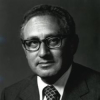Henry A. Kissinger

Henry A. Kissinger
Henry Alfred Kissingeris an American diplomat and political scientist. He served as National Security Advisor and later concurrently as United States Secretary of State in the administrations of presidents Richard Nixon and Gerald Ford. For his actions negotiating the ceasefire in Vietnam, Kissinger received the 1973 Nobel Peace Prize under controversial circumstances, with two members of the committee resigning in protest. Kissinger later sought, unsuccessfully, to return the prize. After his term, his advice has been sought by world leaders...
NationalityGerman
ProfessionStatesman
Date of Birth27 May 1923
CountryGermany
They [American forces] are there as an expression of the American national interest to prevent the Iranian combination of imperialism and fundamentalist ideology from dominating a region on which the energy supplies of the industrial democracies depend.
We must learn to distinguish morality from moralizing.
The illegal we do immediately. The unconstitutional takes a little longer.
I believe that there is a whole set of issues in the world - environment, proliferation, energy, cyberspace - that can only be dealt with on a global basis. The traditional patterns of national rivalry and national competition are not suitable for those cases.
Countries do not assume burdens because it is fair, only because it is necessary.
Jews were segregated from 1933 on. We could only play against other Jewish teams. This wasn't just social segregation; this was the beginning of the extermination of the Jews. That's why my family left Germany in 1938.
An expert is someone who articulates the needs of those in power.
I have always expressed respect for those people who make public declarations.
It is steady, reliable, tough. It never yields to panic. It is never defeated one-sidedly. It achieves everything attainable by character and tenacity.
History is not, of course, a cookbook offering pretested recipes. It teaches by analogy, not by maxims. It can illuminate the consequences of actions in comparable situations, yet each generation must discover for itself what situations are in fact comparable.
If Tehran insists on combining the Persian imperial tradition with contemporary Islamic fervor, then a collision with America and, indeed, with its negotiating partners of the Six is unavoidable. Iran simply cannot be permitted to fulfill a dream of imperial rule in a region of such importance to the rest of the world.
It is barely conceivable that there are people who like war.
Intellectuals are cynical and cynics have never built a cathedral.
[Nixon] wants a massive bombing campaign in Cambodia . He doesn't want to hear anything about it. It's an order, to be done. Anything that flies on anything that moves.